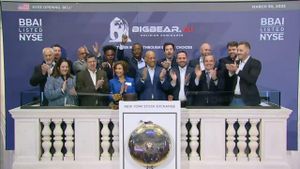Kendrick Lamar’s recent single ‘Not Like Us’ has become the talk of the music industry, particularly as he gears up for his halftime performance at Super Bowl LIX. The song, released on May 4, 2024, functions as both an artistic statement and a stark critique of fellow rapper Drake.
Produced by Mustard, alongside Sounwave and Sean Momberger, ‘Not Like Us’ has been hailed for its West Coast hip-hop sound and clever use of samples, including Monk Higgins’s 1968 track ‘I Believe to My Soul.’ At its core, the song is fueled by Lamar’s long-standing rivalry with Drake and features fierce lyrics targeting his adversary. For example, one notable line states, “Tryna strike a chord and it’s probably A-Minorrrrrrrrrrrrrrrrrrr,” which playfully emphasizes the musical note but serves as metaphorical punch aimed at Drake. This extended vocalization hints at Drake’s alleged reliance on the A minor key, which raises eyebrows considering its layered interpretations.
Lamar lays more serious allegations against Drake, going beyond mere diss tracks. A bold assertion, “Certified lover boy? Certified pedophiles,” directly undermines Drake’s 2021 album title, painting him not just as someone ineffective romantically, but as potentially predatory. Such provocative lyrics have not only intensified their competitive streak but also fueled legal complications, with Drake filing defamation lawsuits against Lamar and Universal Music Group, arguing the song suggests he is guilty of criminal behavior.
The escalation of tension began early 2024, during which both artists traded barbs through various tracks. With ‘Not Like Us’ marking Lamar’s fifth diss aimed at Drake, critics have already recognized its lyrical depth and musical sophistication, and the song has recently copped five Grammy Awards, including Record of the Year and Song of the Year. Lamar has expressed his satisfaction with these accolades, reflecting on the cultural significance of rap: “When people talk about rap… it’s not just something from 50 years ago.” This perspective showcases Lamar’s commitment to eleviating rap as not merely entertainment, but as art.
Setting the stage for his high-stakes Super Bowl performance at the Caesars Superdome, Lamar has hinted at what audiences can expect. During his promotional appearances, he maintained secrecy around specific setlist details but underscored his focus on storytelling. Longtime collaborator SZA is also expected to join him on stage, increasing the intrigue surrounding the event.
Yet, anticipation about whether Lamar will perform ‘Not Like Us’ looms large. The content inspires serious concerns about its appropriateness for the Super Bowl platform, especially considering previous controversies with halftime performances. With some Louisiana lawmakers advocating for family-friendly shows, there are growing discussions on whether Lamar would censor or adjust the lyrics to sidestep potential backlash and legal repercussions. The NFL and broadcaster Fox are weighing options for managing any contentious content, aware of the pitfalls, including defamation lawsuits.
Just days before the event, Lamar shared his views on the excitement of competition, treating it all as ‘a sport’ rather than personal animosity. “I’ve always been very open about storytelling throughout my catalog,” he stated, affirming his belief in the art of performance and not just the content it delivers. This reinforces the depth and personal philosophy driving his artistic choices, which sometimes straddle the line between rivalry and genuine excitement for hip-hop culture.
The potential for Lamar to perform ‘Not Like Us’ is not just bound by his willingness but also responds to broader societal and industry expectations. Observers caution about pushing boundaries and risks, as previous Super Bowl shows have often ignited public and media scrutiny. One notable voice is Too Short, who remarked, “It would be a bigger flex for Kendrick to skip flaming Drake on sports’ biggest stage,” highlighting the tension between artist expression and public perception.
Looking beyond the Super Bowl, the dynamics between Lamar and Drake raise significant questions about identity, authenticity, and the pressures artists face within modern hip-hop. Whether ‘Not Like Us’ will actually grace the halftime stage remains uncertain, but the dialogue ignited by the song is proving as compelling as the music itself. If Lamar does choose to perform, audiences will undoubtedly witness not just the somewhat contentious history between the two rappers but will also engage with the broader discussion around art, responsibility, and the cultural weight of hip-hop.
At the end of the day, Kendrick Lamar stands ready to take center stage, with the world watching to see how he will navigate his narrative and the fierce discourse surrounding it. The Super Bowl halftime performance could either embellish his storied rivalry with Drake or, perhaps surprisingly, steer their competitive spirit toward mutual respect and artistry.



